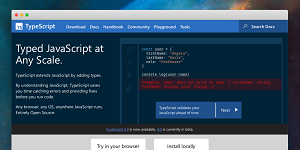News
Microsoft Ships 'Next-Gen' TypeScript 4.0 Milestone
TypeScript hit the v4.0 milestone, featuring a bevy of new features, improvements and fixes as the latest edition of Microsoft's popular open source programming language was said to represent the "next generation" of releases focusing more on expressivity, productivity and scalability.
A company spokesperson told Visual Studio Magazine that the new release revolves around these themes:
- Improving the experience of using TypeScript
- Enhancing performance and scalability
- Expanding the entry-level experience with JavaScript/TypeScript
Because the new release features "no major breaking changes," program manager Daniel Rosenwasser said now was the best time for newbies to get onboard with TypeScript, which clocked in at No. 2 on the list of "most loved" programming languages in a recent Stack Overflow survey. Speaking to that love, Rosenwasser noted that in July the language for the first time hit 50 million downloads in a month via the npm JavaScript package manager.
 [Click on image for larger view.] The New TypeScript Web Site (source: Microsoft).
[Click on image for larger view.] The New TypeScript Web Site (source: Microsoft).
Along with new features, Rosenwasser mentioned the new web site for the language, which Microsoft earlier said was "built out of a desire to make the documentation for TypeScript feel as expansive as its type-system, with a design that fits modern Microsoft styles."
Highlights of the new site include:
- New navigation
- Playground version 3
- Improved documentation
- TSConfig Updates
- Accessibility improvements
- Localization enhancements
As far as new features and improvements, those are mostly the same as the TypeScript 4.0 beta released in June, when we detailed:
Going forward, Rosenwasser pointed to the TypeScript 4.1 iteration plan, which sees v4.1 shipping on Nov. 17. The plan lists new language features and improvements focused on editor productivity, performance and infrastructure.
Developers can try out the latest and greatest features and functionality be using Nightly Builds or via the JavaScript and TypeScript Nightly extension available in the marketplace.
About the Author
David Ramel is an editor and writer at Converge 360.